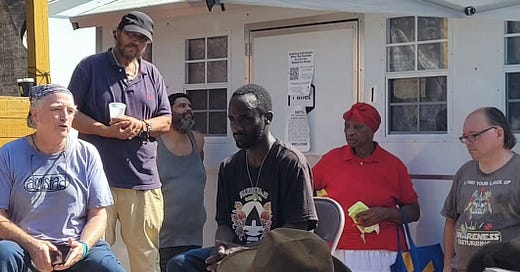City Cuts Power to CW’s ‘Village’ for Homeless
...and California's Gov. Gavin Newsom orders homeless encampments cleared. Also inside: The CW at the National Eucharistic Congress.
Broken and Sinful, Joyful and Hopeful
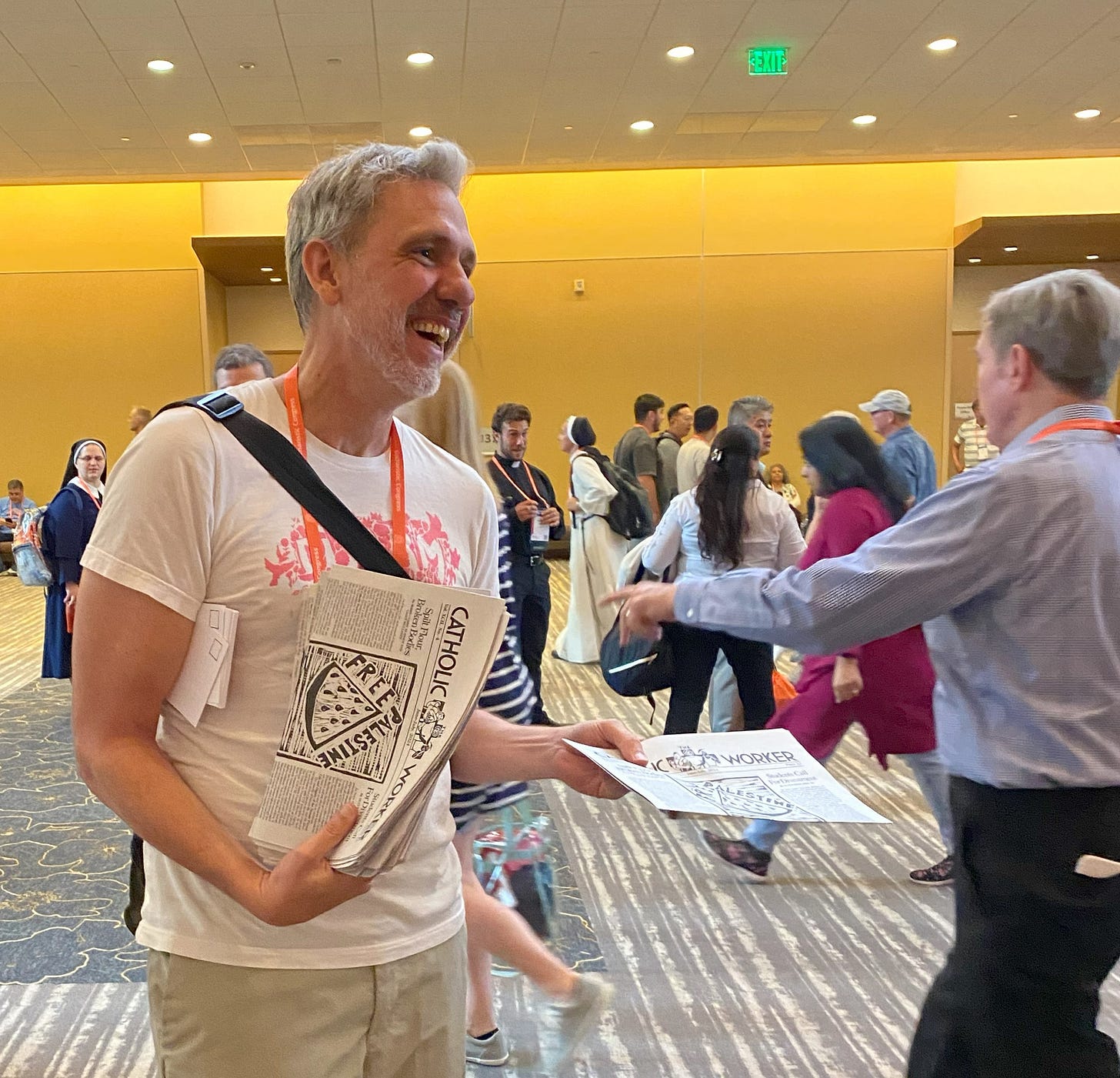
Having worked alongside the Catholic Church for most of my adult life, and having attended plenty of large Catholic conferences, I wasn’t exactly “revved up” going into last week’s National Eucharistic Congress, the gathering of tens of thousands of Catholics in Indianapolis for five days of prayer, worship, and reflection.
For one thing, spending all day sitting around in an overly air-conditioned conference hall when I could be outdoors enjoying a riot of mid-July fecundity—why? Not to mention the crowds and the difficulty of finding real food at reasonable prices ($10 soft pretzels?!). And I have to admit that I kind of expected the whole thing to be dominated by displays of performative piety: “rah, rah” for Club Catholic, “boo” to American secularism and Democratics.
Really, if I hadn’t been going to help one of my writing clients out of a pinch, I would have stayed home.
Friends, I have to admit to being surprised: by the sheer joyfulness of the people, by the near absence of partisan messaging, and by the “hard words” spoken not only by Dorothy Day, via her granddaughter Martha Hennessy, but also by more than a handful of keynote speakers whose call to humility and repentance echoed Dorothy’s own words to the 1976 International Eucharistic Congress in Philadelphia.
“There is no (eucharistic) revival without repentance,” Fr. Mike Schmitz told the Congress on its second night.
“I want to beg you tonight as you stand before God in truth to do that in hope and joy and peace,” Sr. Josephine Garrett said on the following night. “We can be people who repent with courage and joy. What a contradiction to be people who say, ‘I’m broken and I’m sinful, and I’m joyful and I’m hopeful.’”
People took her message of repenting in hope and joy to heart; the confession line was much, much longer than the concession line (which is saying something), and so full of noisy, happy people that you’d be forgiven for thinking you’d taken a wrong turn somewhere.
I was surprised, too, when Sr. Garrett called on the Church “to be corporately repentant as a people,” and then turned to the assembled bishops to (very lovingly) call on them to lead the way.
And I was surprised when, on the final night of the Congress, Gloria Purvis, a Black journalist who was fired by EWTN in 2020 after speaking about racism on air, took the stage and spoke at length about the need for Catholics to repent of the sins of racism and political idolatry; she went so far as to chastise those opposed to making reparation for historic racism. And do you know what? At the end of her speech, that crowd in Lucas Oil Stadium immediately rose to its feet in a raucous ovation.
I don’t want to give the impression that this gathering was anything like the roundtable Martha Hennessy and other Catholic Workers led on two nights in a small park in the shadow of the stadium. There was little talk of mutual aid or decolonization, nor, as Martha pointed out, of the role of the U.S. in the atrocities in Gaza or Ukraine. Nor, as one roundtable participant noted, was there any high-profile acknowledgement of the clerical abuse scandal.
It would seem that if the bishops want a true revival of the American Church, they ought to take up Sr. Garrett’s call to corporate repentance by making a forthright confession of the Church’s historic sins—much as they did in their 2018 pastoral letter on racism (Open Wide Our Hearts, page 21), but on a more comprehensive scale.
No, the Congress was not a Catholic Worker roundtable. Instead, the heart of the Congress was prayer and liturgy, with the breakout sessions focusing mostly on themes of conversion, connection, healing, and repentance.
But maybe that is not a bad place to begin. It is all too easy, after all, to point out the shortcomings of others rather than accepting them as they are, while lovingly calling them to be more.
Maybe healing and repentance—a life more deeply rooted in the living God—is where we all need to begin, recognizing that it is only a beginning, and that our reverence for the incarnate Word must not end with the Eucharistic bread and wine, but be extended to Christ really and truly present in the hungry and wounded people of the world.
You’ll find our coverage of the Catholic Worker at the National Eucharistic Congress below, following news of the latest chapter in the ongoing battle between the city of New Haven and the Amistad Catholic Worker.
Jerry
The Eucharist is in the Poor
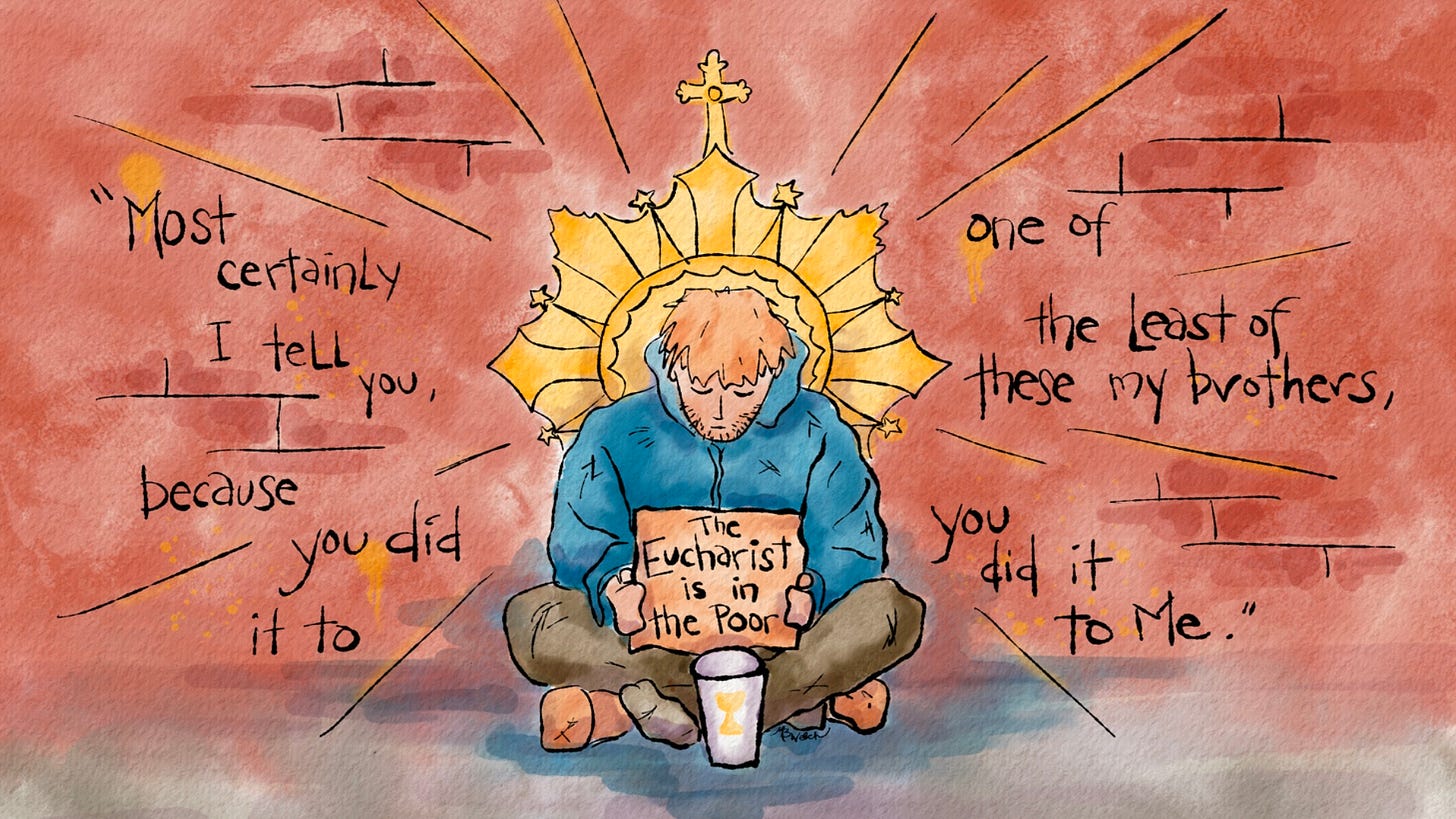
We continue to look for Catholic Worker artists interested in contributing art to Roundtable. If interested, reach out at hello@catholicworker.org.
FEATURED
City of New Haven Cuts Power to Tiny Homes at Amistad Catholic Worker

In the latest episode of a long-running conflict between the city of New Haven and the Amistad Catholic Worker, the city on July 19 cut power to the tiny home ‘village’ for unhoused people that Amistad created in its backyard. Scarlett Rose Ford reached out to Mark Colville at Amistad Catholic Worker and has this update:
After being unhoused for two years, Joel Nieves was able to use his sleep apnea machine for the first time at the Amistad Catholic Worker’s backyard shelter. Last week, the city of New Haven shut off the power to the tiny homes, leaving him defenseless.
“What am I going to do?” Nieves said to the New Haven Independent. “I’m nervous because I don’t know how I’m going to sleep tonight.”
Since the pandemic, Mark Colville and Luz Catarineau of the Amistad Catholic Worker have used the house’s backyard as an encampment for those increasingly being forced onto the streets. The house provided guests with meals, hospitality, and a sense of home.
In October 2023, Amistad took this hospitality to the next level, building six tiny houses to shelter those living in tents. These shelters provided a more permanent residence for those repeatedly displaced by the city.
According to the New Haven Independent, the project cost the house $123,940, amounting to $20,656.67 per unit. The homes were equipped with electricity, heating, and cooling — all of which are essential for surviving the Connecticut seasons.
On July 15, the Amistad shelters’ 180-day provisional permit concluded. Amidst a heat wave, the city of New Haven cut off their power on July 19.
Amistad and their lawyers have been in contact with the city for the past three months in anticipation of the end of this provisional permit. “They intentionally let it run out,” Colville told Roundtable. “We’re not breaking the law.”
Read the rest of this story and see more photos at CatholicWorker.org.
Catholic Workers Bring Messages of Peace, Repentance to National Eucharistic Congress
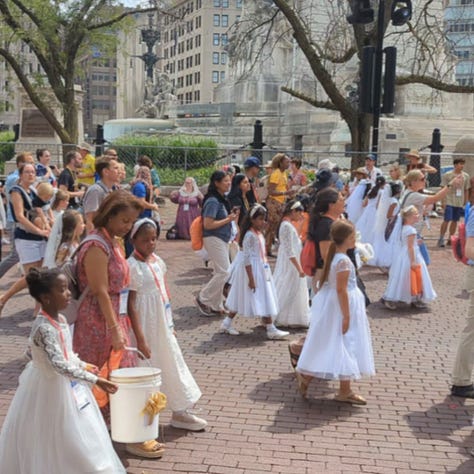
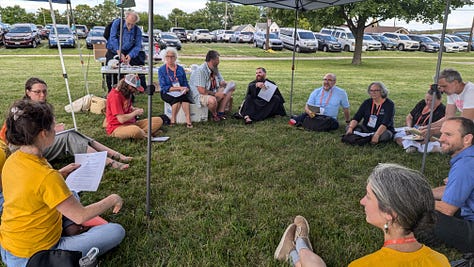
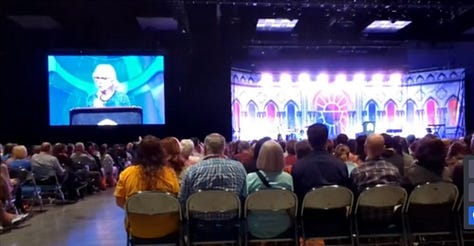
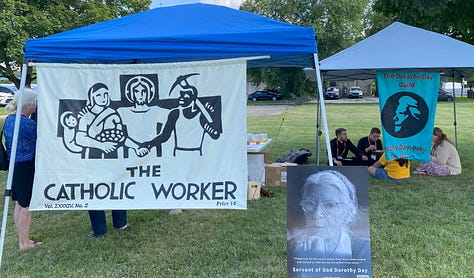
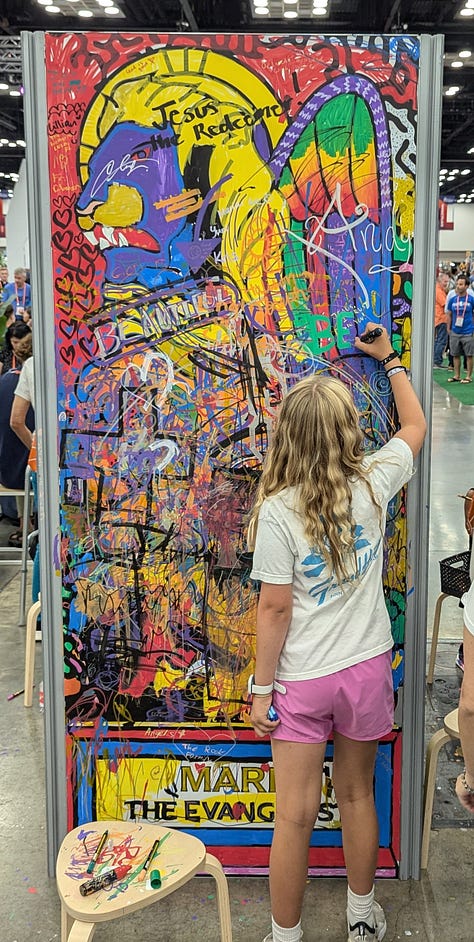
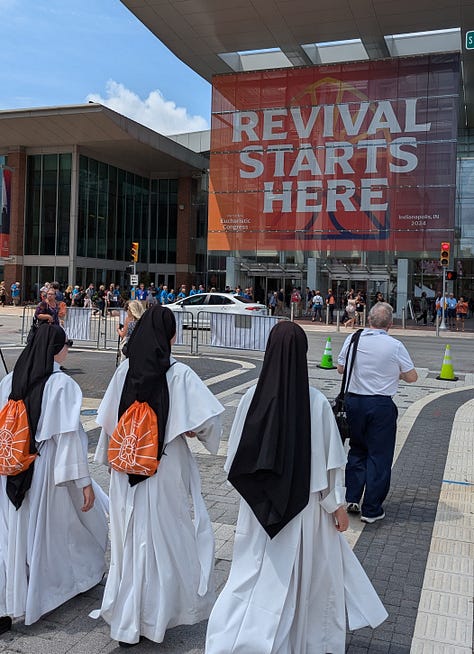



The Catholic Worker had a tiny presence at the National Eucharistic Congress last week in Indianapolis, with about twenty Workers and pilgrims coming together in a park near the Indiana Convention Center for a picnic supper and roundtable.
But despite those small numbers, most of the 50,000 people attending the Congress got to hear about the Catholic Worker Movement and Dorothy Day.
Martha Hennessy, one of Dorothy Day’s granddaughters and a peace activist in her own right, spoke to about 5,000 people during a breakout session on Friday. Catholic Workers from South Bend, Indiana, distributed copies of The Catholic Worker newspaper, Dorothy Day holy cards, and postcards with artwork connecting the Eucharist with care for the unhoused and hungry. And on the final night of the event, Bishop Robert Barron (of the Diocese of Winona-Rochester and Word on Fire fame) delivered an address that used one of Dorothy’s columns as a launching point.
The National Eucharistic Congress was the capstone event in a three-year Eucharistic Revival organized by the U.S. Catholic bishops to revitalize devotion to the Eucharist. The five-day event drew thousands of clergy, religious, and lay Catholics. Daytime sessions featured Catholic speakers, liturgies, and interactive experiences. The evening sessions at Lucas Oil Stadium featured speakers, prayer, worship music, and Eucharistic adoration.
Hennessy’s 10-minute address took place as part of a longer, 90-minute breakout session on Friday morning. For most of her address, which you can read or watch on CatholicWorker.org, Hennessy simply read the words of her grandmother about the Eucharist, including a number of short excerpts from Dorothy’s newspaper columns and diary entries.
“We are nourished by (Jesus’s) flesh, that we may grow to be other Christs,” Hennessy said, reading from a diary entry. “I believe this literally, just as I believe the child is nourished by the milk from his mother’s breast.”
But Hennessy began by reading an excerpt from Dorothy’s “Bread for the Hungry” address to the 41st International Eucharistic Congress in Philadelphia on August 6, 1976. The section that Hennessy read included Dorothy’s noting the significance of the day as the anniversary of the Hiroshima bombing, along with her urging the Congress to practice repentance for the “holocaust” of Japanese lives.
“I plead in this short paper that we will regard…all our Masses today as an act of penance, begging God to forgive us,” she said.
Repentance and the need for communal repentance ended up being the focus of much of the conversation at the Catholic Worker roundtable held in a nearby park that evening. About 20 Catholic Workers and Congress attendees gathered for a picnic of dinner of pizza, sandwiches, and lentil soup provided by the South Bend Catholic Worker. The roundtable discussion began with a reading of Dorothy’s “Bread for the Hungry” address, followed by a wide-ranging discussion.
Read the rest of this article at CatholicWorker.org.
California Governor Orders Removal of Homeless Encampments
In a preview of what is likely to become a more widespread trend, Governor Gavin Newsom on Thursday ordered state agencies to dismantle thousands of homeless encampments.
Newsom's order calls for the “humane removal” of encampments from public spaces, prioritizing those that pose the greatest health and safety risks. While some state agencies will begin immediate action on state property, the governor cannot mandate local governments to clear encampments but can influence them through state-controlled funding for homelessness programs. The directive instructs state agencies to connect encampment occupants with local service providers but does not require relocation to shelters or specify penalties for those who refuse to move.
The state had an estimated 180,000 homeless individuals last year, most of whom were unsheltered, according to the New York Times. California jurisdictions generally do not guarantee a right to housing.
Matt Harper of the Los Angeles Catholic Worker sees the move as part of a historic pattern in which governments cycle through periods in which they provide support and services to unhoused individuals alternating with periods in which the criminalization of homelessness is the main policy focus.
“So, I'm not surprised that as soon as that (Supreme Court) decision was passed, we saw this switch to the hyper-criminalization that always seems to be the bread of the poor,” he said. “For myself, I'm angry, but I'm not surprised. I was kind of expecting that at some point we would see this. But I will say…L.A. is not going to experience the impact of this as much as other parts of California.”
That’s because Los Angeles has passed ordinances offering homeless people more protection, he said, and has a long history of resisting state mandates. Such protections are less likely to be in place in other California cities, about a dozen of which are home to other Catholic Worker communities.
THE ROUNDUP
A settlement that was home to 37 families in the village of Kiganzi, Uganda, was reportedly bulldozed in the middle of the night, according to Ugandan activists, including Ugandan Catholic Worker Michael Setikoleko, who attempted to prevent the illegal land seizure. As reported in Roundtable on July 7, Setikoleko and several other activists were detained and jailed by police for attempting to inform the villagers of their rights under Ugandan law. Following his 28-day detention, Setikoleko has been hospitalized twice, but is now continuing his recovery while social distancing at his parents’ home, he said. He hopes to document the destruction of the settlement by recording interviews with former residents, if they agree to be recorded. “They are living in fear and in terror,” he said in a Whatsapp message.
“Coming out here is not a retreat from the world.” Manhattan-based Bar Crawl Radio took a field trip to Strangers and Guests Catholic Worker Farm in Maloy, Iowa, and interviewed founder Brian Terrell. Listen to their full interview here.
Romero House (Ames, Iowa) is looking for an executive director to keep the community running following the departure of Matt Mitchell to fulfill his vocation by attending minor seminary. While attending school, Mitchell plans to return for visits to the community regularly. More about their mission and future can be found on their website.
PeaceWorks KC will be hosting their 33rd Annual Local Art Fair on September 21st at Theis Park. There will be a vibrant array of artwork from diverse and talented artists, including the unique handcrafted wooden creations of Kent Mead. They are still looking for artists who are eager to show their work along with individuals looking to lend a hand. Details about registration and the general event can be found on their website.
Ed Loring and David Payne of the Open Door Community (Baltimore) participated in the 31st Annual Starvin’ for Justice Fast and Vigil in front of the U.S. Supreme Court from June 29 - July 2 to call for the end of the death penalty. This is not their first time advocating for justice in D.C.; they participated in the ‘Red Line’ this past April. Read more in their July/August newsletter.
https://www.facebook.com/AmosHouseRI
Amos House recently conducted its “A Hand Up” program in Providence, Rhode Island. The program focuses on city beautification while providing essential support services and street outreach. Since the beginning of the year, "A Hand Up" has engaged with over 200 individuals, collected more than 22,000 gallons of trash, and safely removed over 2,000 needles from public spaces, according to a post on the community’s Facebook page. Participants in the program receive comprehensive support, including benefits enrollment, help with obtaining vital documents, housing referrals, access to detox and recovery programs, and transportation assistance.
“Where Vance read St Augustine, I was converted by the diaries of Dorothy Day, an American suffragette, anarchist and founder of the Catholic Worker network of soup kitchens and hostels,” writes Sr. Liz Dodd in London’s iNews. “The God I have come to know is expansive, and looks nothing like the vengeful, White-only projections of the alt-Right. Their Catholicism is not mine. And if they try to trademark it, they’ll have the nuns to contend with.”
Cliff Lichter, a former soldier, Jesuit brother, and hospital orderly, found his true calling as a wandering pilgrim, writes Brian Terrell. Known for living out of a knapsack and frequenting Catholic Worker houses and monasteries, he died on July 11. His ashes will be interred at a South Dakota monastery. Read Brian’s remembrance.
CALENDAR
August 7 | Virtual event
The Long Loneliness Virtual Study Group
August 10 | Vandenberg Space Force Base, California
CW Memorial & Action at Vandenberg Space Force Base
September 6-7 | Chicago, Illinois
Peter Maurin Conference
September 12-15 | Sugar Creek, Iowa
Midwest Catholic Worker Gathering
October 4-6 | St. Francis Catholic Worker, Chicago, Illinois
Catholic Worker National Gathering
A GOOD WORD
“Repent.”
—Dorothy Day’s one-word reply to Time magazine’s inquiry about what she (and other well-known public figures) wanted to say to Americans for the magazine’s bicentennial special edition, according to Bishop Robert Barron.
Roundtable covers the Catholic Worker Movement. This week’s Roundtable was produced by Jerry Windley-Daoust, Renée Roden, Joan Bromberek, Monica Welch, and Scarlett Ford.
Roundtable is an independent publication not associated with the New York Catholic Worker or The Catholic Worker newspaper. Send inquiries to roundtable@catholicworker.org.


